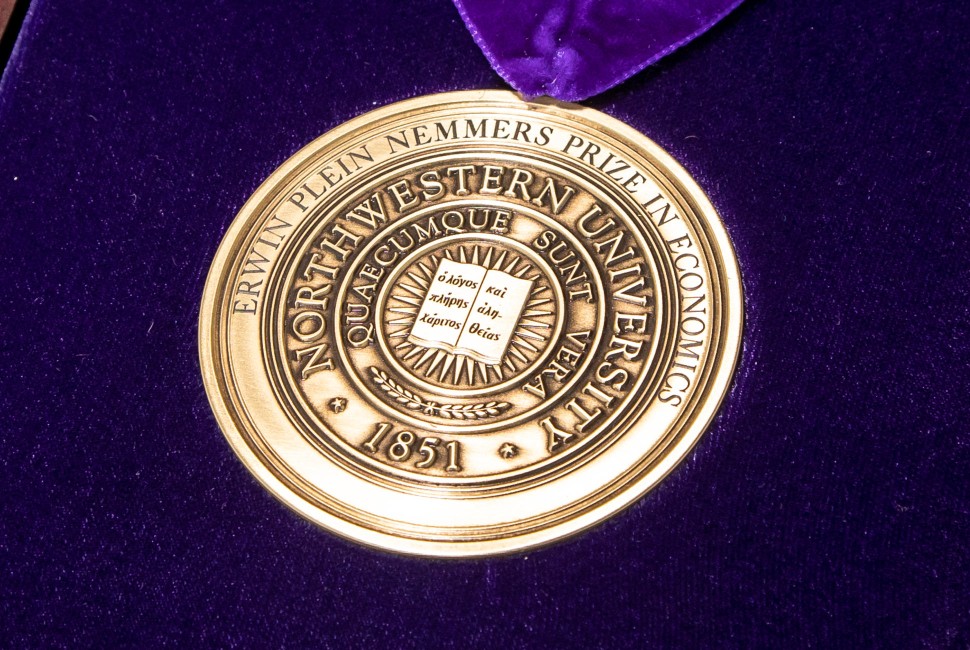Northwestern University has announced the winners of the 2022 Nemmers Prizes in Earth sciences, economics and mathematics. The biennial prizes recognize top scholars for their lasting significance, outstanding achievements, contributions to knowledge and the development of significant new modes of analysis.
This year’s recipients are Emily Brodsky for Earth sciences, Ariel Pakes for economics and Bhargav Bhatt for mathematics. Each will receive $200,000 and will interact with Northwestern faculty and students through lectures, conferences or seminars.
The Nemmers Prizes are named for the family of Erwin Nemmers, a former faculty member in the Kellogg School of Management from 1957 to 1986. Erwin Nemmers persuaded his brother, Frederic Nemmers, to join him in making a significant contribution to Northwestern. Their gifts, totaling $14 million, were designated to establish four endowed professorships in Kellogg and the Nemmers Prizes, which carry some of the largest monetary stipends in each field.
This year’s Nemmers Prize recipients
Emily Brodsky
Emily Brodsky received the Nemmers Prize in Earth sciences, honored for her “fundamental, transdisciplinary contributions to understanding the physics of earthquake networks at all scales.” She is a professor of Earth and planetary sciences at the University of California, Santa Cruz.
As an earthquake physicist, Brodsky studies the mechanics underlying earthquakes to address questions about the processes that trigger earthquakes and the constraining forces that processes that occur inside a fault zone during slip. These studies require expertise in a variety of geoscience disciplines, including seismology, hydrogeology, structural geology and rock mechanics.

After the 2011 Tohoku earthquake off the coast of Japan, Brodsky helped organize and lead a major international expedition to study the fault. Her recent work includes important findings about earthquakes induced by human activities, in which fluids are injected deep underground (e.g., hydraulic fracturing, wastewater disposal and geothermal wells). She currently is chair of SZ4D, a coordinated research initiative to investigate the processes that underlie subduction zone hazards.
A fellow of the American Geophysical Union (AGU) and the Geological Society of America (GSA), Brodsky has received many awards and honors for her work, including the 2008 James Macelwane Medal from the AGU, the 2019 Woollard Award from the GSA and the 2021 Price Medal of the Royal Astronomical Society. Brodsky has served on the boards of directors of the Southern California Earthquake Center and the Incorporated Research Institutes for Seismology. She has published more than 130 peer-reviewed articles and has presented more than 150 invited lectures in 30 states and 13 countries. Her work has been widely featured in the mainstream media.
Ariel Pakes
Ariel Pakes received the Erwin Plein Nemmers Prize in Economics, honored for his “fundamental contributions to the development of the field of empirical industrial organization as it is applied to the study of market power, prices, mergers and productivity.” He is the Thomas Professor of Economics at Harvard University.
In his research, Pakes develops methods for empirically analyzing market responses to environmental and policy changes. He and his collaborators have developed ways to estimate and analyze consumer demand patterns that underlie pricing and product placement incentives, the production functions that underlie the analysis of firm productivity and the investment decisions that underlie the evolution of markets over time.

Pakes and collaborators have demonstrated the usefulness of these tools by analyzing deregulation in the telecommunication industry, demand and product placement decisions in the auto industry, the impact of incentives on doctors’ hospital allocations and consumers’ choices of health insurance plans, the evolution of bidding strategies in a new electric utility market and the development of improved consumer price indices. Subsequently, these tools have become a mainstay of market interactions in much of economics and are often employed by consultancies and regulatory agencies to analyze the likely outcomes of regulatory decisions. They have also been used for internal firm planning.
Pakes is a member of the Econometric Society, the American Academy of Arts and Sciences and the National Academy of Sciences. He has received the Frisch Medal of the Econometric Society, the Jean-Jacques Laffont Prize for research that integrates theory with empirical analysis and the BBVA Frontiers of Knowledge Award in Economics, Finance and Management. Pakes is a laureate of the Web of Science and an honoree of the American Antitrust Institute for Outstanding Antitrust Achievement in Economics. He also is a distinguished fellow of both the Industrial Organization Society and of the American Economic Association. Pakes is a founding member of Microeconomic Insights, a home for summaries of microeconomic research that informs the public about societally relevant microeconomic issues.
Bhargav Bhatt
Bhargav Bhatt received the Frederic Esser Nemmers Prize in Mathematics for his “revolutionary contributions to algebraic geometry in mixed characteristic through a new synthesis of ideas in topology, algebra and arithmetic.” He is the Gehring Professor of Mathematics at the University of Michigan and the Fernholz Professor of Mathematics jointly with the Institute for Advanced Study and Princeton University.

An algebraic geometer, Bhatt is interested in algebraic geometry’s connection to number theory, commutative algebra and algebraic topology. He specifically has made notable contributions to the subject of p-adic Hodge theory, including foundational results on derived de Rham cohomology, the discovery of prismatic cohomology and the construction of Riemann-Hilbert functors for p-adic perverse sheaves. A recent application is Bhatt’s mixed characteristic analogue of the classical Kodaira vanishing theorem. This work led to the solution to longstanding questions in commutative algebra, spurring progress in birational geometry in mixed characteristic.
A fellow of the American Mathematical Society, Bhatt has received several prestigious awards, including a Packard Fellowship, a Compositio Prize, a Simons Investigatorship, a New Horizons Prize and a Clay Research Award. He has delivered many invited lectures, including the Ordway Lectures (Minnesota), Eilenberg Lectures (Columbia), Kempf Lectures (Johns Hopkins), Simons Lectures (Stony Brook), Minerva Lectures (Princeton) and Simons Lectures (MIT) and a plenary talk at the ICM (2022).


